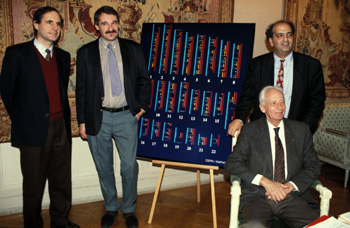Founded in 1990 at the initiative of a patient association, Genethon was first a pioneer in genetics, before becoming a leader in the field of gene therapy.
Genethon, a pioneer in genetics

In 1987, the first Telethon provided the French muscular dystrophy association with the resources to launch large-scale research. In 1990 it created the Genethon laboratory. Its aim was to decode the human genome, establish its first maps, track the genes responsible for genetic diseases and use this knowledge to produce innovative therapies.
In less than two years, Genethon produced the first mapping of the human genome (in 1992), and went on to publish successive versions of it up until 1996, outpacing US teams and boosting global decoding of the human genome.
This worldwide first established the reputation of this exceptional laboratory and put France at the front of the pack in world genetics. Since then Genethon has been involved in the discovery of hundreds of genes responsible for genetic diseases.
Genethon, a pioneer and leader in gene therapy
In 1997, Genethon made a transition and turned to gene therapy. The laboratory produced its first batch of gene therapy vectors for research. One year later, the Gene Vector Production Network (GVPN), bringing together Genethon and the gene therapy laboratories from Nantes and from the Institute Paoli-Calmettes in Marseille, was created to provide the scientific community with innovative, quality vectors standardized for preclinical trials. Then in 1999, a laboratory shared with Harvard Medical School was also created. Between 1998 and 2002, the GVPN issued over 2,500 batches of vectors to 370 French and foreign teams.
2002: Genethon’s first therapeutic projects
In 2002, Genethon launched its first therapeutic projects for diseases of the immune system and the muscle. Three years later, in 2005, the laboratory acquired a “gene and cellular therapy unit” and obtained approval to produce clinical vector batches for trials in humans. In 2006, the laboratory kicked off the first gene therapy trial in humans for a rare muscle disease in Europe, gamma-sarcoglycanopathy.
Gene therapy: first successes for Wiskott-Aldrich syndrome and infant spinal muscular atrophy
In 2010, Genethon launched the first international gene therapy clinical trial involving a severe immune deficiency: Wiskott-Aldrich syndrome (WAS). In 2015, the laboratory demonstrated its effectiveness in six children treated, who saw their immune system restored and their clinical state improved.
Since 2010, Genethon stepped up trials in humans and scored its first victories against the disease.
A first gene therapy medication using technologies derived from pioneering research conducted by a team from Genethon obtained marketing approval from 2019 in the United States, then in Europe and Japan, for infant spinal muscular atrophy (type 1).
In the last 30 years, the financial contribution of AFM-Téléthon has represented more than 70% of Genethon’s overall budget. A paying investment: today, 12 products, developed by Genethon alone or in collaboration with partners, are now in clinical trials around the world for rare diseases of the eye, the liver, blood, immune system and muscles. 3 others should enter the clinic in the next three years.
Genethon’s efforts have paid off: gene therapy has been proving its worth. A medical revolution – involving all of us – is underway.

